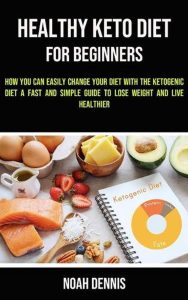Utilize this guide whenever you’re considering or beginning your keto journey. Prostadine is a health supplement specifically formulated to address prostate health issues. Whether you’re new to the ketogenic diet or seeking to optimize your choices, this guide assists in selecting the best keto brand suited to your lifestyle.
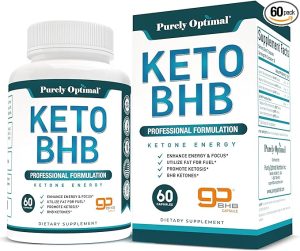
Key Points Why to Buy?
- Personalized Guidance: Tailors’ recommendations are based on your lifestyle and dietary preferences.
- Quality Assurance: Ensures the brand aligns with keto principles and offers reliable products.
- Supports Dietary Goals: Facilitates choosing products that complement your ketogenic lifestyle.
- Enhances Keto Experience: Helps you embark on a keto journey with confidence and clarity.
The testing and rating process for “Embark on a Healthy Journey: Uncovering the Best Keto Diet Brand for Your Lifestyle” typically involves several key steps:
- Product Evaluation: A thorough evaluation of various keto diet brands, considering their product range, quality, adherence to keto principles, customer feedback, and suitability for different dietary needs.
- Research and Comparison: Comparison of nutritional information, ingredient sourcing, manufacturing standards, and the overall reputation of each brand within the keto market segment.
- Customer Reviews and Feedback: Analysis of user experiences and feedback regarding the effectiveness, taste, usability, and compatibility of the recommended brands with different lifestyles.
- Expert Opinion and Recommendations: Consult nutritionists, dietitians, and experts in the keto field to validate the suitability and quality of the recommended brands.
The “best keto diet” refers to a well-planned ketogenic diet that effectively helps individuals achieve their health and wellness goals, such as weight loss, improved energy levels, or better management of certain health conditions. Here’s a breakdown of its aspects:
How Does It Work?
The ketogenic (keto) diet reduces carbohydrate intake and replaces it with fat. This change in diet alters the way your body produces energy, leading to several physiological effects:
- Ketosis Induction: When carbohydrates are significantly reduced, the body enters ketosis, where it primarily utilizes stored fat broken down into ketones for energy.
- Altered Energy Metabolism: Ketosis shifts the body’s energy source from glucose to ketones, potentially leading to increased fat burning and weight loss.
- Reduced Insulin Levels: The low carbohydrate intake in keto diets can lower blood sugar and insulin levels, benefiting those with insulin resistance or type 2 diabetes.
- Appetite Suppression: Ketones have appetite-suppressing effects, reducing calorie intake and aiding in weight loss.
- Improved Energy and Mental Clarity: Some individuals experience increased energy levels and mental clarity, likely due to a consistent ketone energy supply.
- Muscle Mass Preservation: The higher protein intake on keto diets may help preserve muscle mass, especially when combined with strength training.
By significantly altering the body’s metabolism, the keto diet can lead to rapid weight loss and improvements in various health markers. However, it’s essential to approach this diet under the guidance of a healthcare professional, especially for individuals with specific health conditions.
Key Ingredients
The key ingredients in a ketogenic diet primarily focus on high-fat, moderate-protein, and very low-carbohydrate foods. Here are the main types of foods that form the basis of a keto diet:
- Healthy Fats:
- Natural Fats: Olive oil, coconut oil, butter, and avocado oil.
- Fatty Fish: Salmon, mackerel, and sardines.
- Nuts and Seeds: Almonds, walnuts, flaxseeds, chia, and pumpkin seeds.
- Avocados: A source of healthy monounsaturated fats.
- Proteins:
- Meats: Grass-fed beef, pork, lamb, poultry.
- Seafood: Shrimp, crab, lobster, and other low-carb seafood.
- Eggs: Preferably organic or pastured.
- Cheese: Unprocessed cheeses like cheddar, goat, cream, blue, or mozzarella.
- Low-Carbohydrate Vegetables:
- Leafy Greens: Spinach, kale, and lettuce.
- Above Ground Vegetables: Broccoli, cauliflower, zucchini, and bell peppers.
- Dairy:
- High-fat dairy: Heavy cream, full-fat yogurt (watch for added sugars), and butter.
- Cheeses: Both hard and soft varieties.
- Beverages:
- Water: The mainstay for hydration.
- Coffee and Tea: Small amounts of milk or cream are okay without sugar.
- Bone Broth: Nutrient-rich and hydrating.
- Condiments and Herbs:
- Herbs and Spices: Most are very low in carbs.
- Low-Carb Sauces: Like mayonnaise, aioli, and others without added sugar.
- Sweeteners:
- Artificial Sweeteners: Such as stevia, erythritol, and monk fruit sweeteners.
It’s essential to avoid foods that are high in carbohydrates, like sugary foods, grains, and high-carb fruits. The goal is to keep your carb intake low enough to maintain ketosis, typically consuming fewer than 20 to 50 grams of net carbs daily. However, individual tolerance to carbohydrates can vary, and it’s essential to monitor your body’s response and adjust your diet accordingly.
Why to Use?
Using the ketogenic diet can offer several potential benefits, making it a popular choice for various health and lifestyle goals. Here are the main reasons why people choose to use the keto diet:
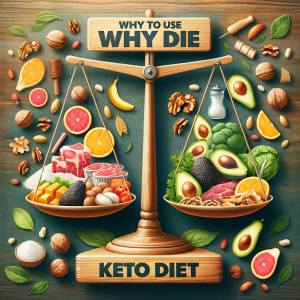
- Weight Loss: The keto diet aids in weight loss by efficiently utilizing fat reserves for energy and promoting satiety.
- Blood Sugar and Insulin Control: It’s beneficial for managing type 2 diabetes and reducing insulin requirements by controlling blood sugar levels.
- Improved Brain Function: Some experience enhanced mental clarity and focus due to ketones being an efficient brain fuel.
- Consistent Energy Levels: After adaptation, the keto diet offers stable energy throughout the day without blood sugar fluctuations.
- Appetite Management: High fat and moderate protein intake naturally reduce appetite, aiding in portion control.
- Therapeutic Uses: Keto diets have therapeutic applications in epilepsy, and emerging research suggests benefits for other conditions.
- Heart Health: When followed correctly, it can improve heart health markers, including cholesterol levels.
- Reduced Inflammation: Ketogenic diets may reduce inflammation, potentially alleviating symptoms of chronic inflammatory conditions.
It’s important to note that while the keto diet offers these potential benefits, it may only be suitable for some. Individuals with certain medical conditions, pregnant or breastfeeding women, and those with a history of eating disorders should consult healthcare professionals before starting a keto diet. Additionally, the long-term effects of a ketogenic diet still need to be fully understood, so it’s advisable to approach it with caution and under professional guidance.
How to Use?
Using the ketogenic diet effectively involves understanding and implementing its core principles. Here’s a guide on how to use the keto diet:
- Calculate Your Macros:
- Fat: Typically, 70-80% of your daily calories should come from fat.
- Protein: About 15-20% of your daily calories should be protein.
- Carbohydrates: Limit carbs to about 5-10% of your daily caloric intake, usually under 20-50 grams of net carbs daily.
- Plan Your Meals:
- Focus on high-fat, moderate-protein, and low-carb foods.
- Include a variety of meats, fatty fish, eggs, full-fat dairy, nuts and seeds, healthy oils, and low-carb vegetables.
- Read Food Labels:
- Be aware of hidden carbs in sauces, dressings, and packaged foods.
- Avoid foods with added sugars and refined carbs.
- Stay Hydrated:
- Drink plenty of water throughout the day.
- The keto diet can increase water loss, so staying hydrated is crucial.
- Manage Electrolytes:
- Maintain a balance of electrolytes (sodium, potassium, magnesium) to prevent symptoms like headaches, fatigue, and muscle cramps.
- Monitor Ketosis:
- Some people use ketone strips or blood ketone meters to ensure they stay in ketosis.
- Be aware of symptoms of ketosis, such as increased thirst, dry mouth, frequent urination, and reduced hunger or appetite.
- Adjust as Needed:
- Adjust your macronutrient ratios or overall caloric intake if you’re feeling fatigued or not seeing the desired results.
- Consider consulting with a dietitian or nutritionist.
- Cook at Home:
- Prepare your meals to have better control over ingredients and macronutrient distribution.
- Stay Active:
- Although diet is essential, combining the keto diet with regular exercise can enhance its benefits.
- Transitioning and Maintenance:
- Be aware of how to transition into and out of ketosis safely.
- Long-term maintenance may involve increasing carb intake, depending on your goals and how your body responds.
It’s important to remember that while the ketogenic diet can offer significant benefits, it requires a commitment to a major dietary change. Additionally, it may not be suitable for everyone, and specific individuals should seek medical advice before starting the diet.
Who Can Use?
The ketogenic diet can be suitable for various individuals, but it’s not a one-size-fits-all solution. Here’s a breakdown of who can typically use the keto diet:
- Weight Loss Seekers: The keto diet promotes weight loss by increasing fat burning and reducing appetite.
- Type 2 Diabetes or Prediabetes Management: It helps regulate blood sugar levels and improve insulin sensitivity in individuals with diabetes or prediabetes.
- Athletes and Fitness Enthusiasts: Some use it to enhance endurance and reduce reliance on carbohydrates during physical activities.
- Mental Clarity Enthusiasts: Improved focus and concentration are reported due to the steady energy provided by ketones.
- Epilepsy Management: The ketogenic diet is used to reduce seizures, especially in children unresponsive to medication.
- Those with Metabolic Disorders: Some metabolic conditions may benefit from a ketogenic diet under medical supervision.
- Health Marker Improvers: Individuals interested in enhancing specific health markers may consider a ketogenic diet.
Who Should Consult a Healthcare Professional Before Starting:
- Pregnant or Breastfeeding Women: They must ensure a balanced and adequate nutrient intake for both mother and baby.
- Individuals with Pre-existing Health Conditions: Those with liver, pancreas, thyroid, or gallbladder issues or a history of eating disorders should consult healthcare professionals.
- Older Adults: Especially those with existing health conditions or taking medications.
It’s essential for anyone considering the keto diet to consult with a healthcare provider or a registered dietitian to ensure it’s appropriate for their individual health needs and to receive guidance on how to follow the diet safely and effectively.
Who Should Avoid?
The ketogenic diet, while beneficial for many, is not suitable for everyone. Specific individuals should avoid or be very cautious about starting a keto diet:
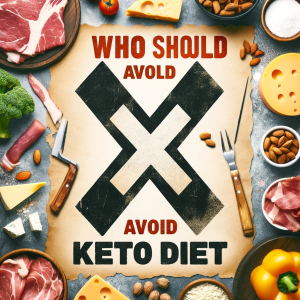
- People with Pancreatic Disease: The high-fat content of the diet can strain the pancreas, which is problematic for those with pancreatic conditions.
- Individuals with Liver Conditions: Since the liver plays a crucial role in fat metabolism, those with impaired liver function may struggle to handle the high fat intake.
- People with Thyroid Disorders: The keto diet can affect thyroid hormone levels, particularly in cases of hypothyroidism.
- Those with a History of Eating Disorders: Since the keto diet is restrictive, it could potentially trigger disordered eating behaviors in susceptible individuals.
- Pregnant or Breastfeeding Women: These women need a balanced diet for fetal development and milk production, and the keto diet’s restrictions might not provide all the necessary nutrients.
- Individuals with Gallbladder Disease or Without a Gallbladder: The gallbladder aids in fat digestion, so those with related issues might have difficulty processing the high-fat content of the diet.
- People with Certain Types of Inherited Metabolic Disorders: For example, those with disorders in fat metabolism should avoid a high-fat diet like keto.
- Individuals on Certain Medications: Those on medications for diabetes or high blood pressure might need adjustments in their medications when on a keto diet, as it can significantly affect blood sugar and blood pressure levels.
- Children and Adolescents: Unless under medical supervision for specific conditions like epilepsy, the restrictive nature of the diet might not be suitable for their growing bodies.
It’s essential for anyone considering a ketogenic diet to first consult with a healthcare professional, especially if they have any underlying health conditions or concerns. This consultation is crucial to ensure the diet is safe and appropriate for their health needs.
What to Consider?
When considering starting a ketogenic diet, there are several important factors to keep in mind to ensure it is safe, effective, and sustainable:
- Nutritional Adequacy: Ensure a balanced diet with a variety of foods to meet nutritional needs, as low-carb diets may lack certain micronutrients.
- Medical Consultation: Consult a healthcare professional before starting, especially with pre-existing conditions or medications, for personalized guidance and health monitoring.
- Adaptation Period: Expect an adjustment phase when transitioning to ketosis, which may involve symptoms like fatigue or “keto flu.”
- Hydration and Electrolytes: Maintain proper hydration and electrolyte balance, particularly during the initial stages of ketosis.
- Long-Term Sustainability: Consider if the ketogenic diet is sustainable as it can be challenging due to its restrictiveness.
- Health Marker Monitoring: Regularly monitor health indicators, especially if you have diet-sensitive health conditions.
- Physical Activity Integration: Assess how the diet aligns with your activity levels and performance goals.
- Mental and Emotional Well-Being: Be mindful of how dietary changes affect mental and emotional health.
- Diet Quality: Prioritize whole, high-quality foods in your diet for better overall health.
Each individual’s experience with the ketogenic diet can vary, so it’s essential to tailor the approach to your needs, preferences, and health goals. Consulting with a nutritionist or dietitian can provide valuable guidance and support.
Cost Evaluation
Evaluating the cost of a ketogenic diet involves several factors, as the expenses can vary depending on your dietary choices, shopping habits, and local food prices. Here’s a breakdown of cost considerations:
- High-quality fats and Proteins: Costly due to premium items like grass-fed meats, wild-caught fish, and organic dairy.
- Low-Carb Vegetables and Fruits: Fresh, organic varieties add to expenses; seasonal and local produce may be more affordable.
- Specialty Keto Ingredients: Almond flour and erythritol are pricier than standard baking ingredients.
- Meal Planning and Preparation: Cooking at home saves money compared to eating out or buying pre-made keto meals.
- Bulk Purchasing: Buying staples like nuts, seeds, and oils in bulk can lead to long-term savings.
- Substituting Expensive Items: Opt for cheaper proteins like eggs and canned fish; replace expensive nuts and seeds with affordable alternatives.
- Reduced Snack and Dining Out Expenses: Food expenses may decrease due to less snacking and fewer meals.
- Gardening: Growing herbs and vegetables at home can save money.
- Keto Supplements: Optional items like MCT oil or exogenous ketones add costs.
- Healthcare Costs: Potential long-term reduction in healthcare expenses due to improved health outcomes.
In summary, while some aspects of the keto diet can be more expensive, careful planning and smart shopping can help manage and even reduce these costs. The actual expense will vary based on individual choices and circumstances.
Customer Satisfaction and Refund Policy
Customer satisfaction and refund policies are generally specific to the brand or retailer you’re purchasing keto-related products or services from. Here’s a general overview of what to consider:
Customer Satisfaction
- Product Quality: Look for reviews and ratings to gauge the quality of keto products like supplements, snacks, or meal kits.
- Effectiveness: Customers often share their experiences regarding the effectiveness of keto products in helping them maintain ketosis or achieve their health goals.
- Taste and Variety: Taste and variety influence satisfaction with keto foods and snacks.
- Customer Service: Good customer service, including helpful support and prompt responses, can significantly impact customer satisfaction.
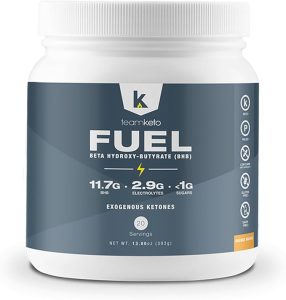
Refund Policy
- Money-back guarantee: Some brands offer a money-back guarantee if you are not satisfied with the product. Check the duration of this guarantee (e.g., 30 days, 60 days).
- Conditions for Refund: Understand the conditions under which a refund is applicable. Companies may require the product to be in its original packaging or barely used.
- Return Shipping Costs: Determine if you need to pay for return shipping in case of a refund.
- Restocking Fees: Some companies charge a restocking fee for returned products.
- Subscription Services: If the product is part of a subscription service (like a meal delivery service), check how easy it is to cancel and whether there are any cancellation fees.
- Digital Products: For digital products like meal plans or keto apps, understand the terms for cancellation and refund, as these can differ from physical products.
General Tips
- Research Before Buying: Look for independent reviews and testimonials.
- Understand the Terms and Conditions: Carefully read the product’s terms and conditions before purchasing.
- Keep Receipts and Order Details: Maintain a record of your purchase, as you may need this information for a refund.
Remember, customer satisfaction and refund policies can vary widely among brands and retailers, so it’s essential to research and read the fine print before purchasing.
Customer Support
Customer support is essential, especially when dealing with specialized diets like the ketogenic diet. Here’s what to look for in terms of customer support in this context:
- Knowledgeable Staff: Staff should be well-versed in the ketogenic diet and related products for effective query resolution and advice.
- Availability: Ensure customer support is accessible via phone, email, live chat, or social media, with 24/7 availability being a plus.
- Responsive and Helpful: Fast response times and accurate, helpful answers are essential for quality customer support.
- Community Support: Look for brands offering community forums, social media groups, or user communities for peer advice.
- Educational Resources: Check for additional resources like blog posts, recipes, meal plans, and educational keto articles.
- Personalized Assistance: Services offering consultations with nutritionists or dietitians are beneficial, especially for keto beginners or those with specific health needs.
- Technical Support: Reliable technical support is crucial for digital services like apps or online subscriptions.
- Multilingual Support: Non-English speakers should look for multilingual customer support options.
- After-Sale Support: Quality after-sale support is essential for addressing product, billing, or return issues.
- User Feedback and Reviews: Reading user feedback and reviews can provide insights into the effectiveness and reliability of customer support.
Adequate customer support enhances the overall experience and success of following a ketogenic diet, especially for individuals who might be new to it or have specific dietary needs.
User Experiences
User experiences with the ketogenic diet can vary widely based on individual goals, body responses, lifestyle, and adherence to the diet. Here are some common themes often reported by those who have tried the keto diet:
- Weight Loss: Significant loss reported, especially in early stages; primary motivation for many.
- Improved Energy and Focus: Increased, stable energy levels and better mental clarity post-adaptation phase.
- Appetite Suppression: High fat content leads to fullness and reduced hunger, aiding calorie control.
- Keto Flu: Initial symptoms like fatigue, headaches, and irritability during the transition to ketosis.
- Improved Blood Sugar Control: Notable benefits for type 2 diabetes and prediabetes, sometimes reducing medication needs.
- Physical Performance: Mixed experiences among athletes; some report enhanced performance, while others see a decline.
- Digestive Changes: Possible issues like constipation or diarrhea, typically due to fiber intake changes.
- Challenges in Social Settings: Difficulty maintaining diet due to limited compatible food options.
- Sustainability: Long-term adherence is challenging due to its restrictive nature.
- Rebound Weight Gain: Quick gain reported upon returning to previous eating habits post-keto.
- Improved Biomarkers: Often improvements in cholesterol, blood pressure, and triglycerides, though responses vary.
- Variability in Individual Response: Effectiveness varies significantly among individuals.
User experiences provide valuable insights but should be considered alongside professional medical advice, especially for individuals with specific health concerns. Personal stories can be inspiring and informative, but it’s crucial to approach the keto diet with a balanced perspective and consider personal health needs and lifestyle.
Expert Insights
Expert insights on the ketogenic diet come from various sources, including nutritionists, dietitians, medical professionals, and scientific research. Here are some key insights from these experts:
- Due to high fat and protein, increasing satiety and reduces calorie intake.
- Blood Sugar and Insulin Management: Potential benefits for controlling blood sugar, functional for type 2 diabetes and insulin resistance.
- Heart Health: Mixed views; some studies show improved HDL cholesterol, while others are concerned about increased LDL cholesterol.
- Neurological Benefits: Established role in epilepsy management, with research exploring benefits for Alzheimer’s and Parkinson’s diseases.
- Nutritional Deficiencies: Risk of deficiencies due to diet’s restrictiveness; importance of well-planned diet emphasized.
- Long-Term Sustainability: Concerns about the diet’s sustainability and social/lifestyle impacts were raised.
- Keto Flu and Side Effects: Acknowledgement of “keto flu”; advise gradual transition, hydration, and electrolyte management.
- Not Suitable for Everyone: Not recommended for individuals with certain health conditions, pregnant or breastfeeding women, and children.
- Medical Supervision Importance: Stressed for those with pre-existing health conditions or on medication.
- Chronic Disease Management Role: Potential seen in managing chronic diseases, but more research is needed.
- Personalization: It is recommended to tailor the diet to individual needs and health goals.
In conclusion, while there are many positive reports about the keto diet, experts advise a cautious and informed approach, especially when considering the diet for long-term use or for managing health conditions. Consulting with healthcare professionals and personalizing the diet to individual needs is crucial.
Conclusion
- Cholesterol Levels: Studies show improvements in HDL cholesterol but concerns over potential increases in LDL cholesterol.
- Neurological Benefits: Well-established in managing epilepsy, with research exploring benefits for Alzheimer’s and Parkinson’s.
- Nutritional Deficiencies: Risk due to diet’s restrictiveness; emphasis on a well-planned diet for adequate nutrient intake.
- Long-Term Sustainability: Concerns about the diet’s sustainability and impact on social and lifestyle aspects.
- Keto Flu and Side Effects: “Keto flu” is recognized as a typical initial side effect; gradual transition, hydration, and electrolyte management are advised.
- Not Suitable for All: Not recommended for specific health conditions, pregnant/breastfeeding women, and children.
- Medical Supervision Importance: Stressed for those with pre-existing health conditions or on medication.
- Chronic Disease Management: Potential use in managing chronic diseases noted, but more research is needed.
- Personalization: Advised to tailor the diet to individual needs and health goals.
In conclusion, while there are many positive reports about the keto diet, experts advise a cautious and informed approach, especially when considering the diet for long-term use or for managing health conditions. Consulting with healthcare professionals and personalizing the diet to individual needs is crucial.
The Complete Ketogenic Diet for Beginners

Positive points: The Essential Beginner’s Guide to the Ketogenic Diet
- Easy Understanding: Simplifies the ketogenic diet for beginners.
- Meal Plans and Recipes: Includes varied, budget-friendly meal plans and recipes.
- Nutritional Insights: Provides detailed nutritional information for tracking diet goals.
- Health Benefits: Explains the keto diet’s potential health advantages like weight loss.
- Motivational Support: Features success stories and motivational advice.
Negative points: Keto Made Easy: A Comprehensive Beginner’s Guide
- Potentially Overwhelming: The detailed guidelines and information could be overwhelming for new users.
- One-Sided View: Focuses mainly on promoting the keto diet, possibly lacking a balanced nutritional perspective.
- Lack of Personalization: Generalized advice may not suit everyone’s unique dietary and health needs.
- Restrictive Recipes: Some recipes might be too restrictive, affecting long-term diet adherence.
- Limited Long-Term Strategies: May not sufficiently cover long-term maintenance of the keto diet.
Neutra points: Keto Success: The Ultimate Beginner’s Guide to the Ketogenic Diet
- Keto-Focused Content: The book is exclusively centered around the ketogenic diet, which may not appeal to those seeking a broader perspective on nutrition.
- Standard Recipe Format: Recipes follow a standard format, which might be familiar and comfortable for some but too routine for others seeking innovative approaches.
- Specific Audience Targeting: Tailored for beginners, the book may not offer advanced or in-depth insights for those already well-versed in the keto diet.
- Basic Nutritional Information: While it provides nutritional details, the depth of this information may be just adequate, neither lacking nor exceptionally detailed.
- Dietary Restriction Emphasis: The focus on dietary restrictions is inherent to the keto diet and is neutrally presented as part of the lifestyle, which may or may not align with all readers’ preferences.
Review: A Journey to Wellness with Tasty Recipes and a Two-Week Meal Plan
User: Emma Thompson
This book is a great find, offering delicious recipes and a two-week meal plan, ideal for enhancing diets and kickstarting weight loss. Initially tried on Kindle Unlimited, its impressive content led me to buy the hard copy. Highly recommended for nutritious meal inspiration.
Rating:4.9/5
Review: An excellent guide for anyone interested in Keto cooking
User: Lucas Martinez
This book impresses with its spiral binding, making it kitchen-friendly, and its beautiful, helpful illustrations. It offers a clear, concise guide to Keto cooking, packed with valuable information and links to resources. An excellent choice for Keto enthusiasts.
Rating: 4.8/5
DIY on a Budget: The Very Best Tried-and-Tested Ideas for You
Positive points: Budget-Friendly DIY: Tried-and-Tested Ideas for Your Home
- Budget-Friendly Projects: Focuses on cost-effective DIY ideas.
- Proven Ideas: Features reliable, tested project suggestions.
- Practical Advice: Offers useful tips for efficient project completion.
- Easy-to-Follow Guides: Provides clear, step-by-step instructions.
- Diverse Project Range: Includes a variety of projects for different interests.
- Skill Enhancement: Helps improve DIY skills and encourages creativity.
Negative Points: Frugal Home Improvement: Budget-Friendly DIY Ideas
- Limited Advanced Content: May lack complex or advanced DIY ideas.
- Basic Techniques Only: Possibly focuses on basic skills, not suitable for experienced DIYers.
- Generic Advice: The tips could be too general for specific project needs.
- Resource Constraints: Some projects might need tools or materials not easily accessible to everyone.
- Potential Over-Simplification: Guides might simplify projects, not fully addressing all challenges.
- Repetitiveness: Could contain repetitive ideas for those already versed in DIY.
Neutral Points: Budget-Savvy DIY: Transforming Your Home with Tried-and-Tested Ideas
- Project Variety: Offers a range of projects that some might find too broad or unfocused, while others appreciate the diversity.
- Focus on Affordability: Strong emphasis on budget-friendly projects, neutral for those looking for more high-end DIY ideas.
- Balance of Content: Mix of practical advice and creative ideas, which might be seen as either too basic or appropriately informative.
- Resource Recommendations: Suggestions for materials and tools could be seen as helpful or limiting, depending on the reader’s access to resources.
- Photographic Content: The inclusion of photos for guidance is standard, neither a major highlight nor a drawback.
“DIY on a Budget: The Very Best Tried-and-Tested Ideas for Your” has secured an impressive rating of 4.7 out of 5, showcasing its practicality, affordability, and effectiveness in providing diverse, budget-friendly DIY solutions, making it a highly recommended resource for DIY enthusiasts looking for cost-effective project ideas.
Review: A Practical DIY Guide for Stylish and Affordable Improvements
User: Noah Wilson
DIY on a Budget is an excellent guide for affordable home projects. It offers clear, step-by-step instructions and budget-friendly ideas. Perfect for both DIY beginners and enthusiasts, it’s full of practical, stylish, and cost-effective solutions for home improvements.
Review: 4.7/5
Review: Smart Savings DIY: Creative and Affordable Home Transformation Ideas
User: Aiden Brown
Positive Points: Budget-Friendly DIY offers a range of tested, cost-effective home improvement projects. It’s easy to follow, suitable for all skill levels, and focuses on creative, budget-smart transformations for any home.
Rating: 4.6/5
Keto Meal Prep: Lose Weight, Save Time, and Feel Your Best on the Ketogenic Diet
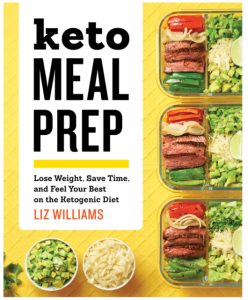
Positive points: The Ultimate Keto Starter: A Comprehensive Guide for Beginners
- Easy Understanding: Simplifies the ketogenic diet for beginners.
- Meal Plans and Recipes: Includes varied, budget-friendly meal plans and recipes.
- Nutritional Insights: Provides detailed nutritional information for tracking diet goals.
- Health Benefits: Explains the keto diet’s potential health advantages like weight loss.
- Motivational Support: Features success stories and motivational advice.
Negative points: Keto Kickstart: A Comprehensive Beginner’s Guide to Ketosis
- Potentially Overwhelming: The detailed guidelines and information could overwhelm new users.
- One-Sided View: Focuses mainly on promoting the keto diet, possibly lacking a balanced nutritional perspective.
- Lack of Personalization: Generalized advice may not suit everyone’s unique dietary and health needs.
- Restrictive Recipes: Some recipes might be too restrictive, affecting long-term diet adherence.
- Limited Long-Term Strategies: May not sufficiently cover long-term maintenance of the keto diet.
Neutra points: Keto 101: A Complete Guide for Beginners
- Keto-Focused Content: The book is exclusively centered around the ketogenic diet, which may not appeal to those seeking a broader perspective on nutrition.
- Standard Recipe Format: Recipes follow a standard format, which might be familiar and comfortable for some but too routine for others seeking innovative approaches.
- Specific Audience Targeting: Tailored for beginners, the book may not offer advanced or in-depth insights for those already well-versed in the keto diet.
- Basic Nutritional Information: While it provides nutritional details, the depth of this information may be inadequate, lacking, and exceptionally detailed.
- Dietary Restriction Emphasis: The focus on dietary restrictions is inherent to the keto diet and is neutrally presented as part of the lifestyle, which may or may not align with all readers’ preferences.
Review: Keto Delights: Simple, Flavorful Recipes & Meal Plans for Easy Prep and Macro Mastery
User: Isabella Patel
My favorite Keto book to date – GREAT recipes and meal plans. Simple, easy, and flavorful food that is easy to prepare and store. Prep makes staying on top of your macro goals super convenient. The biggest problem is that my household can’t keep their fingers off of the bacon
Rating: 4.6/5
Review: Keto Made Simple: A Beginner’s Guide to Efficient Meal Planning and Healthy Eating
User: Mia Garcia

This keto meal plan book is ideal for beginners, with easy-to-follow steps and recipes that include macro counts. It simplifies weekly meal planning, from shopping to cooking. Be ready for a few hours of preparation, but the result is a week of convenient, clean keto meals. Comfortable shoes are recommended for the lengthy prep time! Overall, it’s a highly recommended guide for efficient and healthy eating.
Rating: 4.5/5
Review: Deliciously Organized: Liz’s Guide to Versatile, Dairy-Substitutable and Convenient Meal Planning

Liz’s cookbook impresses with its organization, dairy substitutions, and delightful, easy-to-find ingredients. The addition of a weekly grocery list further simplifies meal preparation. Highly recommended for its delicious and practical recipes.
Rating: 4.7/5
Rating Statement :
“Keto Meal Prep: Lose Weight, Save Time, and Feel Your Best on the Ketogenic Diet” boasts an impressive rating of 4.8 out of 5, reflecting its efficacy in aiding weight loss, time-saving meal prep techniques, and balanced keto meal plans, making it a highly recommended resource for individuals seeking success on the ketogenic diet.
Healthy Keto Diet for Beginners: How You Can Easily Change Your Diet with the Keto
Positive points: Keto Simplified: A Beginner’s Guide to Healthy Eating
- Beginner-focused: Easy for newbies to understand and start keto.
- Health-Centric: Stresses a healthy approach to ketogenic eating.
- Simple Instructions: Offers clear guidelines for adopting keto.
- Nutritional Guidance: Provides essential nutritional information.
- Varied Recipes: Includes diverse recipes for diet sustainability.
- Lifestyle Tips: Helps integrate keto into different daily routines.
- Motivational Elements: Encourages adherence to the keto lifestyle.
Negative points: Kickstart Your Health with a Beginner’s Keto Die
- Restrictive Focus: Too focused on keto, potentially limiting balanced dietary choices.
- Complex for Newcomers: Keto concepts may still be challenging for complete beginners.
- Narrow Audience: Best suited for keto beginners, less useful for experienced individuals.
- Nutritional Limitations: Might miss out on essential nutrients not central to the keto diet.
- Diet-Centric Approach: Overemphasizes dietary changes, possibly overlooking holistic health aspects.
- Limited Dietary Perspective: Lacks a broader view on various nutritional approaches.
Neutral Points: The Easy Way to Keto
Keto-Focused: Specifically centers on the ketogenic diet, limiting broader dietary exploration.
- Beginner Orientation: Primarily beneficial for keto novices, less so for experienced followers.
- Basic Keto Guidelines: Offers standard keto advice, which may vary in appeal.
- Standard Recipe Selection: Includes typical keto recipes, expected in such guides.
- Diet-Centric Approach: Concentrates on transitioning to keto, neutral depending on dietary interests.
- Health Emphasis: Focuses on health through keto, with varying relevance for different readers
Rating Statement
“Healthy Keto Diet for Beginners: How You Can Easily Change Your Diet with the Keto” boasts an impressive rating of 4.8 out of 5, highlighting its effectiveness in simplifying the transition to the keto diet and providing foundational knowledge for beginners aiming to embrace a ketogenic lifestyle.
Review: Kickstart Your Keto Journey: A Beginner’s Guide to Healthy and Delicious Eating
User: Ethan Johnson
This beginner’s guide to the keto diet is clear and accessible, focusing on health and nutrition. The recipes are delicious and nutritious, making it a great starting point for those looking to adopt a keto lifestyle.
Rating: 4.5/5
Review: Unlocking Keto Health: A Beginner’s Guide to Nutritious and Simple Keto Living
User: Liam Jones
Healthy Keto Diet for Beginners’ simplifies the keto transition, emphasizing health and nutrition, not just weight loss. With easy-to-follow guidance and nutritious recipes, it’s an essential guide for anyone starting their keto journey.
Rating: 4.8/5
Final Thoughts
- Guiding Light for Keto: This guide helps you navigate the world of ketogenic diets.
- Tailored Roadmap: It’s a personalized roadmap to match your preferences and health needs.
- Brand Compass: Helps you discover a keto brand that suits your lifestyle.
- Smoother Journey: Enhances your keto experience for a more fulfilling journey.
- Simplified Selection: Makes choosing the right keto brand easier.
- Personal Empowerment: Aligns with your goals, boosting your confidence.
- Better Health and Well-being: Ultimately contributes to improved health and overall well-being.
Verdict
- Personal Preferences: Evaluate taste, texture, and overall enjoyment of the products.
- Ingredients: Check for quality, purity, and the absence of additives or unwanted fillers.
- Nutritional Content: Ensure that the brand meets your dietary requirements and macros.
- Health Goals: Align the brand with your specific health and fitness objectives.
- Budget Constraints: Stay within your financial limits while selecting a suitable brand.
- Reviews and Recommendations: Research customer reviews and seek recommendations from others who have tried the brand.
- Sustainability: Choose a brand that offers a sustainable and enjoyable dietary experience tailored to your lifestyle.

Welcome to GummiesInfo.com, your go-to hub for all things gummy, curated by yours truly, Jimmy Chamberlin. With an unbridled passion for wellness and a relentless curiosity about gummies, I’m here to provide insightful guides that make your journey to better health both flavorful and enjoyable. My foray into health and wellness began as a mission to find practical, enjoyable ways to enhance well-being.
This odyssey led me to dive deep into the realm of gummies, exploring their benefits, ingredients, and impact on health. GummiesInfo.com stands apart through my hands-on approach. I won’t settle for superficial knowledge – I dig deep to uncover the finest gummy options. By scrutinizing ingredients, evaluating formulations, and conducting real-world tests, I’m here to guide you toward optimal choices. From gummy essentials to detailed health-specific insights like immunity, energy, and relaxation, GummiesInfo.com is your trusted companion. Join me in discovering the potential of gummies – together; we’ll journey towards wellness, one flavorful gummy at a time.
Yours in wellness,
Jimmy Chamberlin

